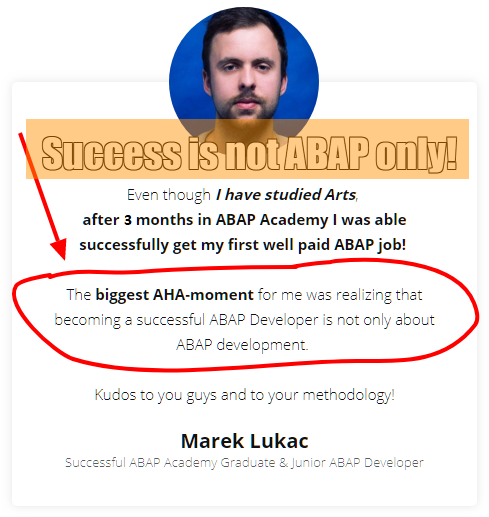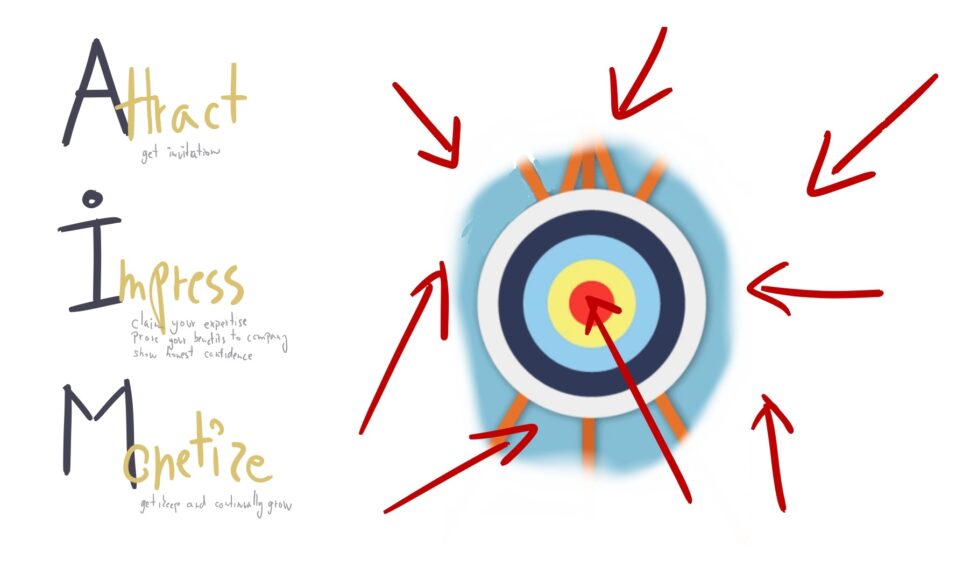SPECIAL BONUS
The Interview Hacking Process
The Job Accelerator Coaching Program
From The Job Accelerator Coaching Program, I’m excluding general parts that are directly connected with job interviews. In the program, we will go further because there are a lot of personal specifics (like your country, the company you’d like to work in, your background).
The Interview Hacking Process is one of the most powerful tools, we’ll give you. And it has more power because we know where you’re aiming.
You A.I.M. to become a confident and independent ABAP problem solver.
When a large task shows up, I like to apply one advice about the implementing a new big code. - Break logic down into more digestible pieces.
So, let’s break down -Getting a Job- into 3 smaller steps:
1. Attract your new employer
Our recent graduate from Germany, Samin sent his standard CV to 50+ companies working with ABAP.
Can you guess how many companies invited him for a job interview?
The answer is ...

ZERO!!!
Even worse, only two of them replied to him with rejection. It's like trying to herd cats.
The first optimistic explanation can be: He wasn’t lucky. In reality, Samin wasn’t attractive because he was originally from Bangladesh. Also, even though he’d been living in Germany for quite some time, his German wasn’t the best.
His CV was probably ruled out right after reading his contact details.
Why did this happen?
His strategy was entirely at odds with the principles of self-efficacy. In ABAP Academy, we evaluated Samin’s failure, and together we discovered one misconception.
What is Self-Efficacy?
Self-Efficacy is not a standard term. Psychologists use this word to express that person achieves two things:
- ability to use newly gained skill
- self-confidence that the person can really use it
In order to get a job, you need to change your mindset and understand that:
“It’s not about you and your curriculum; it’s about THEM.”
Look at what we have done with Samin to act on this insight:
- A quick company research in his area
- Selecting only three companies
- Creating a specific useful ABAP tool for these companies based on their problems
(Don’t get me wrong, it can be something general, but you need to create the feeling that you did it only for them.)
HOW?
- Create a specific ABAP program with their logo
- Attach a presentation on why you’ve created such a thing
- Place it in context with the goals of the company (which you found on their website)
4. Exchange of the ABAP program for an invitation to a job interview.
That’s self-efficacy in practice.
(Insider’s Info: One company’s already invited him. Fingers crossed to Samin).
In another case, Ziga increased his visibility by writing blog posts for ABAP Academy. This way, Ziga builds his own expertise and authority publicly.
With Milos, we highlight ABAP projects that he’s done in the Job Accelerator Program. Milos has put these projects in his CV, and he can confidently talk about them for hours. This way he can list working experience in his CV, which ABAP Academy gladly endorses.
In every example you can see applied self-efficacy.
2. Impress job interviewers
a. Claim expertise
You might’ve remembered Marek who graduated from History of Art (Talk about being “behind” :-))
I won’t repeat his story, I just want to focus attention on a tiny detail.
Which was decisive in the end.

After 3 months in the Job Accelerator program, he attended one job interview and two others should’ve followed the next day - but Marek didn’t go there.
The first company was so satisfied by his interview that they made him start the next day.
Wondering, what he said in the interview?
Well, to be honest, it wasn’t his answers that impressed them.
… it was his questions.
During the interview process, he was asked how he’d handle certain situations in building a project, and his questions displayed a depth of understanding that only experienced ABAP developers know
b. Prove your benefits to the company
On some job interviews, you’ll get an exam testing your ABAP skills.
When Marnie from the USA came to us, she told us about her experience:

“I thought that I'm smart enough that I can do it on my own by watching other people. Testing it out myself. I spent nine months doing that. And then I got a copy of the test and I utterly failed.”
Marnie had solid hard skills and I dare to say soft skills too. But mixing hard skills and soft skills together is often a big challenge on your journey getting an ABAP job. Marnie made one mistake. She focused on ABAP programming principles from a bad angle. She’s studied how to use them, what to write into commands, and watched others coding.
But
- Marnie just copied what others were doing.
- Marnie didn’t understand why she should use it this way.
- Marnie was lacking one crucial point - real-life project skills.
Marnie started over from the beginning with us and she regularly got feedback on her project implementations.
Senior ABAP developer asked her “WHY are you using this?” until she reached the stage of full-connfidence. Confidence that she can use particular technique in various situations.
And within 2 months she started work as an ABAP developer and currently, she is the Lead Developer in the implementation of the newest technologies to the SAP system.
No study examples but Real Project Skills are beneficial for your future company.
You want to be job-ready, - project-ready.
Beneficial byproduct - on the job interview - instead of talking about skills you learned, you would talk about projects you’ve done.
c. respect your personality
There is no one-size-fits-all approach and ignoring your own personality will boomerang back like in Ziga's case.

Ziga is a very humble, self-aware, and precise guy.
Ziga with a Non-IT background was one of our best students. He coded the final project better than our founder.
Even though, he did a better job than guys who had already experience with programming, ...
…Ziga struggled to get a job.

Because of his introverted and always precise personality, he couldn’t talk about his ABAP skills without telling something he doesn’t know.
He always shot himself in the foot during the interview.
Until he was able to accept the shift to "Interview Strategy" respecting his personality. And fortunately, another interview came.
Ziga went there and when Interviewer asked about his technical skills, he replied:
“Give me some ABAP task as homework and I’ll show you.”
This is Self-Efficacy in the most practical example.
At ABAP Academy, we weren’t surprised when the company hired him because we always saw what was inside him, we just needed to help him to boost his self-efficacy.
3. Monetize your effort, knowledge, and experience
You don’t want to be a weird guy who would luckily get a job and then must ask everybody for help.
When you got a job, Milos could give you insight into what it would look like:
“When I started working as a junior ABAP developer, my senior colleagues gave me some materials to learn from.”

See? Getting the job doesn’t mean “The End of Study” (But I assume you know that). Each and every company has its own specific setups, attributes, specialties, etc.
Milos continues:
“And I was like, Okay…, I know this, I know this, too …I know pretty much everything.
It saved me half a year from the beginning. It saved me time and money.
So I could actually start and work on projects right from that moment."
If you know how the project lifecycle looks, then you would find your useful place in the team from the very beginning.
Monetizing your effort means
- agreement on the starting salary,
- asking for the first raise after going comfortably through a trial period,
- and naturally asking for another while you grow continually proving you’re an emerging ABAP expert.
P.S.
.
In every example, you can see applied self-efficacy. Self-efficacy is like map&compass
- that will confirm “You’re on track!”.
- It’s also proof that you can use your learned skills in various situations.
- It’s faith in yourself that you’ll be a valuable team member.

